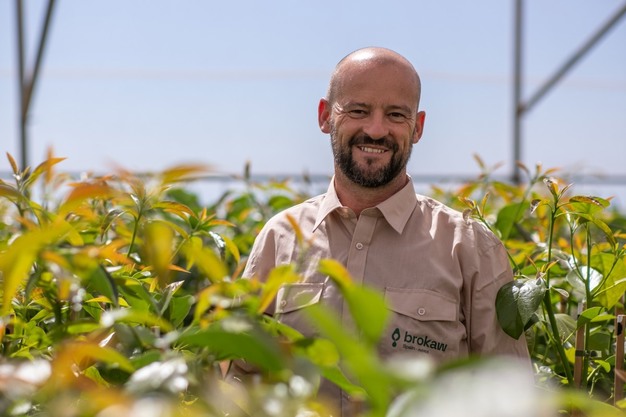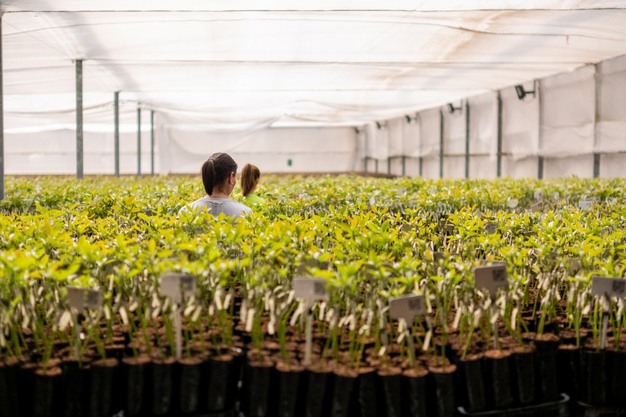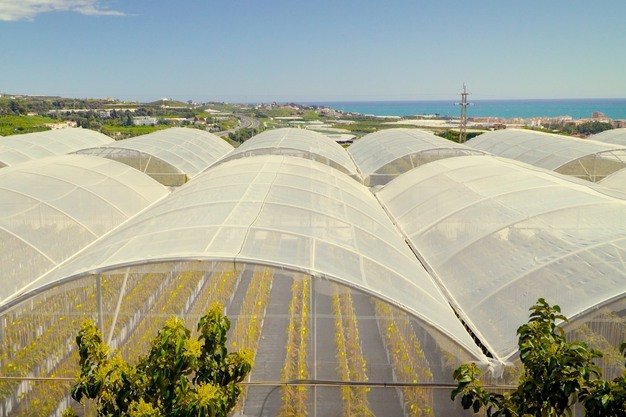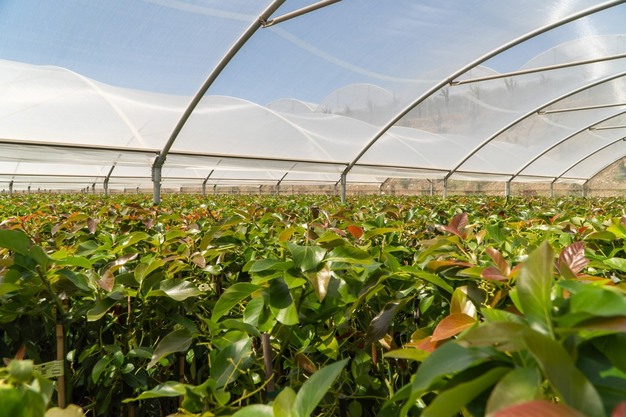The expansion of subtropical crops in the Mediterranean is pushing mango and, above all, avocado into the spotlight. European demand is driving the growth of plantations and the introduction of clonal avocado varieties, promising higher yields, consistency and resilience to variable conditions.
José María Fernández, CEO of Brokaw Spain, which annually produces between 800,000 and 900,000 seedlings, says that avocado is their main driving force, while mango is gaining ground as a strategic complement. The biggest challenges have to do with efficient water management and the need for varieties to adapt to new environments, but there are also opportunities for export to international markets. Geographical expansion is especially considered on areas with better water availability and higher productivity to ensure long-term viability. Within this framework, clonal avocado is playing a key role in stabilizing yields and expanding the European supply of quality avocados.
 © Brokaw España
© Brokaw España
-How many seedlings does Brokaw sell per year and which species?
Brokaw Spain sells between 800,000 and 900,000 seedlings every year, with the capacity to do well over one million units. Avocado continues to be our flagship crop, and more than half of that production is already made up of clonal plants, which have become the preferred option for growers and investors thanks to their homogeneity and the profitability they provide compared to seedlings. We continue to offer seedlings in certain markets, and mango also plays a very important role in our annual production, with varieties that are perfectly adapted to the Mediterranean climate and are increasingly in demand in Europe.
Our main focus continues to be on avocado, which accounts for more than 70% of our total production and for which we have the widest range of clonal and seed rootstocks on the market.
Clonal avocados are the main category, with around 500,000-600,000 units per year, which reflects the growing reliance of producers in genetic homogeneity, resistance to Phytophthora and the greater profitability compared to seedlings.
To that we must add between 200,000 and 250,000 avocado seedlings, which are still in demand in certain areas due to their lower initial cost. Mango is the second most important, with some 150,000-180,000 plants per year, mainly of commercial varieties such as the Osteen, Kent and Keitt, well-adapted to the Mediterranean climate and with an expanding European market.
Besides avocado and mango, we are committed to diversification and to helping growers with the introduction of other subtropical fruit trees, such as cherimoya, lychee and passion fruit, among many others, which are arousing growing interest both in Spain and in international markets. The wide range of species, the capacity to work at an industrial scale and the experience accumulated over more than 40 years allow us to solidly and reliably tackle any project, from small farm to large-scale developments. That is our pride: to make top quality plants available to the sector and to provide our knowledge to those who are betting on the future of subtropical crops.
-What are the most popular crops?
In our nursery, avocados undoubtedly remain the most popular crop. It is the species that accounts for the highest sales volume and Brokaw has managed to make a difference at an international level thanks to the production of plants with clonal rootstocks. Growers have seen in practice that this type of plant allows for more homogeneous farms, with greater productivity and earliness, and that is why today more than 80% of the avocados we produce are already clonal. This trust from the sector in our plant material is the best guarantee that we are responding to what they really need.
Mangoes have also been becoming more popular in recent years, especially in areas with water restrictions or more demanding soil conditions. Varieties such as the Osteen, Kent or Keitt have shown excellent performance and are increasingly in demand by growers seeking to diversify their crops. We are also seeing a growing interest in other subtropicals with good prospects in both the fresh market and the processing industry.
Our mission is to meet this demand with a solid, technically proven supply and with the certainty that each plant delivered by Brokaw will guarantee the success of the plantation.
-Is it true that due to the lack of water resources for avocado crops in Malaga, as well as the severe drought in the last 8 years (until this year), the avocado acreage in this province has been reduced and more emphasis has been placed on mango? Is there any growth in production forecast for the future?
It is true that the drought in recent years in La Axarquía in Malaga and on the coast of Granada has put a brake on the expansion of avocados in these areas. The limited water resources have forced many growers to rethink the setting up of new plantations and to optimize the use of available water as much as possible. In this context, mango has gained ground because it is a crop with lower water requirements that is also better adapted to certain soil and salinity conditions. We have seen this first-hand: the demand for mango plants has grown precisely in those places where avocados have found it most difficult to grow.
However, it would be a mistake to think that avocados have lost their prominence. What we’ve seen happen is a geographical redistribution. While Malaga has seen its acreage stabilize, other areas such as the Valencian Community, Cadiz, Huelva or even the Cantabrian coast are in the midst of an expansion phase. These are regions with greater water availability or with very favorable weather conditions, and avocado projects there continue to grow at a good rate. In the immediate future, we don’t foresee a reduction in avocado production in Spain, but rather a transfer of new plantations to areas with more water resources.
At Brokaw, we remain committed to both avocado and mango, because both have enormous market potential. Our role is to advise producers on the choice for the most suitable species and rootstock depending on the conditions of each farm. This proximity and long-term vision allows us to say that subtropical production in Spain will continue to grow, although in a more balanced and sustainable way, adapted to the climatic reality and the future of water resources.
 © Brokaw España
© Brokaw España
-Do you think it is possible to expand mango plantations outside the subtropical environment of Malaga and Granada?
Mango has proven to be a crop with great potential outside the traditional environment of Malaga and Granada. It is true that these areas account for most of the acreage due to their subtropical conditions, but experience has shown that there are other areas in Spain and North Africa with a Mediterranean climate and availability of water that can successfully accommodate new mango plantations. We are already seeing growers diversifying their farms by incorporating mango as an alternative to avocado.
The key lies in the right choice of varieties and in adapting cultivation techniques. Varieties such as the Osteen, Kent or Keitt do very well in environments with mild winters and warm summers, as long as there’s proper irrigation and soil management. At Brokaw we offer not only the plant, but also personalized advice from a technical team, precisely to ensure that each new planting is viable in the chosen environment.
Therefore, the answer is yes: mango can expand outside the subtropical area, and it will do so wherever the weather conditions and water supply allow it. We believe that, in the coming years, this crop will continue to gain ground in the Mediterranean arc and in other areas with favorable conditions, consolidating itself as a profitable and sustainable alternative for many producers, as long as conditions in the international mango market allow it.
Avocado acreage has expanded outside Malaga and Granada in the last 10 years. In which provinces or growing areas has it grown the most and in which areas can there be potential to expand avocado cultivation in Spain?
In the last decade, we have seen a real transformation in the geographical distribution of avocado in the Iberian Peninsula. The Valencian Community has been the great driving force, going from just a few hundred hectares to well over 3,500 hectares in 2023 and with the capacity to continue developing. Cadiz and Huelva are also developing strongly thanks to the quality of their soils, the availability of water and a temperate climate that ensures stable production. These areas, together with the Axarquia in Malaga and the coast of Granada, account for most of the domestic production today.
In the future, however, growth will happen also in other territories. Portugal is consolidating its position as a major player in avocado cultivation, especially in the Algarve and some areas of the Tagus valley, where the soil and weather conditions are optimal. The Cantabrian coast, on the other hand, represents both a challenge and a great opportunity: its mild winters and cool summers are similar to those of some areas of Mexico where avocados originated, and the first plantations are already yielding encouraging results.
Internationally, Brokaw sees huge growth potential in the Mediterranean arc and in regions with similar subtropical climates. Countries such as Greece, Italy, Turkey or Lebanon are already among our export markets, and other destinations in North Africa are opening up to the crop with great interest. Our role is to facilitate this expansion with plants adapted to each environment and with the necessary technical backing to ensure the profitability and sustainability of the projects.
-Does the Valencian Community have the capacity to continue expanding its production?
In recent years, the Valencian Community has consolidated as one of the main areas for avocado expansion in Spain. Growth has been spectacular, going from just a few hundred hectares to more than 3,500 in just a decade. And the key aspect is that this development has not been cyclical, but structural: the combination of a Mediterranean climate, the availability of water in certain areas and a highly professionalized agricultural sector means that the region still has the potential to expand its acreage.
Added to this is a differential factor: the conversion of part of the citrus crops to avocado cultivation. The Valencian Community has producers who are highly-skilled in agricultural management and who are used to working with intensive productions, optimizing resources and integrating technology in the field. In addition, decades of experience in citrus cultivation have given them a mastery of logistics and fruit marketing in national and international markets, which today is a great advantage for the successful introduction of avocados.
At Brokaw we see that there is still the capacity to continue growing, as long as it is done with adequate planning and well-dimensioned projects. The key is not only to plant more, but to do so in a sustainable way, with the right choice of rootstock and varieties adapted to each soil and water quality. This is where our experience adds value. We can advise producers to ensure that each new plantation is viable in the long term. In short, the Valencian Community not only has room for expansion, but it also has the human and commercial conditions necessary for this growth to consolidate and boost Spain’s leadership in the European avocado market.
 © Brokaw España
© Brokaw España
-In which other countries are you selling seedlings?
Apart from the Spanish market, which is still our main destination, at Brokaw we’ve had a very clear internationalization strategy for years. We are currently exporting seedlings to countries in the Mediterranean arc such as Portugal, Italy, Greece, Turkey and Lebanon, which, due to their soil and climate conditions, are becoming very important areas for the cultivation of avocados and other subtropical crops. These markets particularly value the quality and homogeneity of our clonal plants, which is a guarantee of success right from the start of planting.
Today, almost 50% of our turnover comes from exports and Brokaw’s strategy will continue to rely on them in the coming years. Our quality, international reputation and capacity to respond should allow us to continue growing outside Spain, alongside with the development of new production areas.
We have also made occasional shipments to more distant destinations, always working hand in hand with local partners and adhering to the strictest phytosanitary protocols. Our position as the world’s leading producer of clonal avocado in greenhouses is allowing us to cater to both large investment projects and medium-sized farms seeking to diversify safely. In short, we are not just seeking to sell plants, but to consolidate our position as the partner of choice for growers and investors who are committed to subtropicals in any part of the world.
-Are there long waiting lists to buy the product, as we’ve seen in previous years?
It is true that a few years ago, with the strong expansion of avocado and the entry of new investors into the sector, there were times when demand far exceeded supply and we had waiting lists of up to two years. Today the situation is different. We have strengthened Brokaw’s production capacity, made our processes even more professional and planned together with our customers further in advance. This allows us to respond quickly even to large-scale projects, while maintaining the quality standards we are known for.
However, planning remains essential. Our recommendation is that growers make their orders well in advance, because this gives us the necessary margin to produce the plant in a timely manner, adapted to the conditions of each project. Thanks to our current capacity, we can supply the plants needed in about a year, always depending on availability and the production times required for the supply of top quality plant material.
In short, we can say that Brokaw currently has the capacity to meet the sector’s demands without the long waiting lists of the past, but our philosophy is still the same: the success of a plantation begins long before the tree arrives in the field. Planning well and ordering in advance is the best guarantee for the growers to receive a homogeneous, healthy plant when they need it, thereby facilitating the success of their farm.
-Do you think that the avocado and mango acreage will continue to grow in the coming years in the Mediterranean area?
Avocado consumption in Europe continues to grow at a very solid rate, reaching record figures in recent years. Countries such as France and Germany have been driving this increase, and avocado is consolidating as a staple product for millions of Europeans. This trend is boosting the expansion of the area devoted to the crop in Spain and Portugal, where we are already close to 24,000 hectares planted, with a 7% growth in 2023 alone.
In this context, we are convinced that both avocado and mango will continue to increase their presence in the Mediterranean arc. Our growers’ proximity to the European market, their logistical capacity and their experience are advantages that our overseas competitors do not have. Areas such as Valencia, Cadiz, Huelva or the Portuguese Algarve still have great potential to grow in terms of acreage, while innovative projects on the Cantabrian coast are showing that the crop is adapting to new climatic conditions. Mango, for its part, is consolidating its position as an alternative in areas with restrictions in the water supply and is attracting increasing interest in the Mediterranean arc.
What’s essential is that this growth is properly planned and sustainable. At Brokaw we are working on precisely this: offering rootstocks that are more resistant to drought or salinity, providing technical advice to the growers, and guaranteeing that each new plantation can be profitable in the long term. The European market is demanding this and Spain and Portugal are in a privileged position to lead this expansion in an orderly and efficient way.
 © Brokaw España
© Brokaw España
-What are the main challenges for you as producers and distributors of tropical fruit seedlings?
One of the main challenges we face is undoubtedly water management. Drought and the pressure on water resources are increasingly forcing us to work with rootstocks that are tolerant to stress conditions. We also advise the implementation of efficient irrigation systems and sustainable management practices. We must not forget that the future of subtropical crops in the Mediterranean depends on responsible and technified water use.
Another key challenge is adapting to new soil and climatic conditions. Avocado and mango cultivation is expanding to areas where it was not thought possible before, from the Cantabrian coast in Spain to the eastern Mediterranean and North Africa. This requires constant research, genetic innovation and field trials to ensure that each plant is well-adapted to its destination. At Brokaw we are carrying out studies and trials of new rootstocks that in the coming years will offer solid alternatives to growers, especially in those farms which are currently limited by water quality, salinity or soil characteristics. Our commitment is to anticipate these needs and provide the sector with practical and reliable solutions.
Lastly, I’d also like highlight the sector’s professionalization. More and more growers, cooperatives and international investors are betting on subtropicals, and our challenge is to respond with production capacity, traceability, compliance with international standards and a first class technical service. The goal is not just to deliver seedlings, but to become a strategic partner for the producer. That is the responsibility we have at Brokaw and also the reason why we remain leaders, because we want to be the right partner for every project.
Are you presenting anything new for Fruit Attraction?
This year we are coming to Fruit Attraction with great enthusiasm and a lot to show. Our technical and sales team will be there and they are Brokaw’s best asset; professionals with a great deal of experience, who will be delighted to meet with anyone considering starting a project with avocados or other subtropical crops. It will also be a perfect time to meet with many of our long-standing customers, to review together how their plantations are evolving and to learn about the latest status of projects that we’ve been in charge of in recent years.
Being at the fair will also allow us to share new technical and commercial material that we’ve prepared specifically to support investment decisions. We want every producer, cooperative or investor who pays us a visit to get the best information for the correct sizing of their projects. Our agenda of international meetings is really full, because Fruit Attraction has become an essential meeting point for the sector. And this year we are strengthening our presence even more with our strategic alliance with Brokaw Maroc, with which we are working together to respond to the demands of such an important and dynamic market as Morocco.
Our stand, 9F10, will be the meeting place for all our customers, partners and friends. We will be delighted to welcome visitors, listen to their needs and share where the future of avocado and subtropical fruit trees is heading. In short, for us, Fruit Attraction is the ideal occasion to continue building relationships of trust and to show that at Brokaw we are ready to back the sector in the challenges and opportunities that lie ahead.
 © Brokaw EspañaFor more information:
© Brokaw EspañaFor more information:
Viveros Brokaw
Tel.: +34 952 03 03 62
[email protected]
https://www.viverosbrokaw.com
Source: The Plantations International Agroforestry Group of Companies
